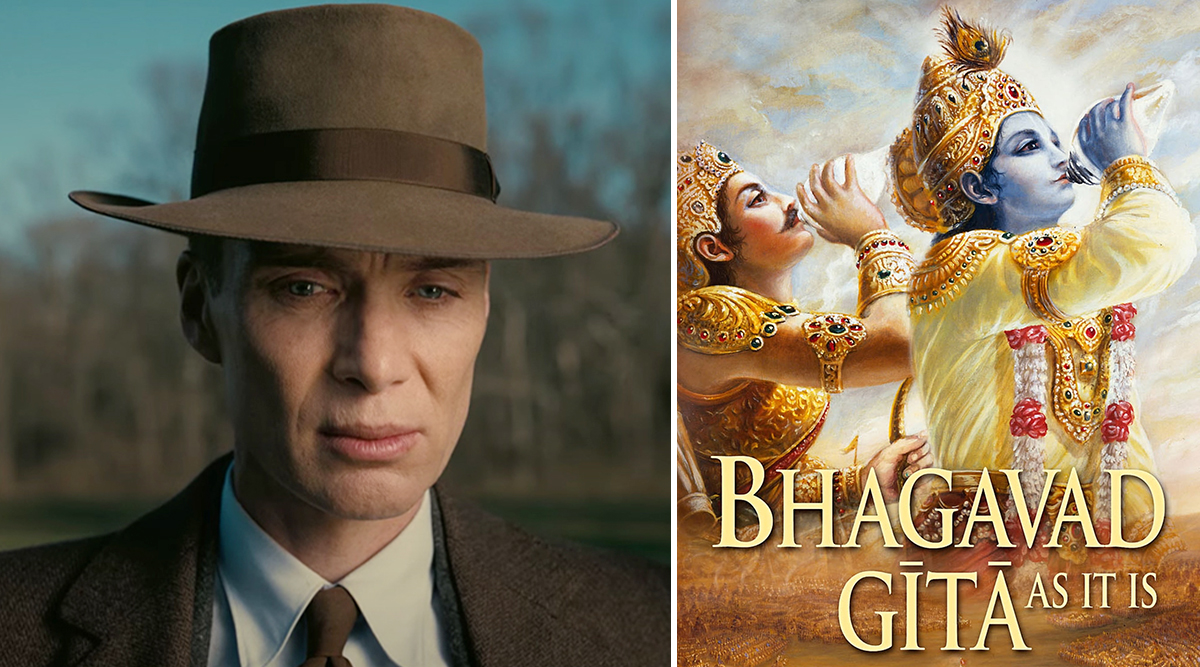With Christopher Nolan's 'Oppenheimer' gearing up for its theatrical release, interest in the life of J. Robert Oppenheimer, also referred to as the 'Father of the atom bomb', has skyrocketed, especially his leaning towards Hinduism and his references to the Bhagavad Gita.
Oppenheimer and his team altered the course of human history during World War II with the Manhattan Project, which led to the creation of the first nuclear bomb in 1945.
(Also Read: Chris Evans' Brother DEFENDS Star's ROMANCE With Portuguese Actress Alba Baptista! (Details Inside))
Throughout the course of his life, particularly during the nuclear tests, Oppenheimer found a strong source of inspiration in the classical Hindu text, the Bhagavad Gita, to which he looked for many answers that helped shape his entire philosophy of life itself.
This was especially true, when faced with the enormity of his creation and the devastation it could unleash, the physicist cited the law of dharma or sacred duty from the Bhagavad Gita. Oppenheimer, who kept a well-worn copy of the Bhagavad Gita close by his desk, even distributed copies among his friends, including once at the memorial service of US President Franklin D. Roosevelt.
The scientist was heavily influenced by the 700-verse dialogue between the prince of the Pandavas, Arjuna and Lord Krishna on the Kurukshetra battlefield. Questioned over the ramifications of the Manhattan Project, Oppenheimer based his justification to go ahead with its development on the basis of the argument Krishna told Arjuna on understanding his dharma or sacred duty as a warrior when it came to fighting his own loved ones.
As a warrior, Krishna argues that Arjuna's dharma is to fight, no matter what the outcome, and the warrior will best serve both himself and society by performing his duties as a warrior in the face of battle. Krishna said that for Arjuna the pacifist's route isn't a selfless one, but rather one born of his own desires, and if everyone began rejecting their duties in the face of hard choices, then the whole world would fall into disarray.
Influenced by this perspective of dharma, Oppenheimer separated his dharma, which was to help create the bomb, from that of the Government leaders, whose dharma lay in making the final decision to push the button and determine the when and where. As he would later state, "I did my job which was the job I was supposed to do." In historian James Hijiya's summary, "It was the duty of the scientist to build the bomb, but it was the duty of the statesman to decide how to use it. Oppenheimer clearly and repeatedly acknowledged these very different dharmas."
According to Hijiya, Oppenheimer's understanding of the concept of dharma was pretty clear. He said that the physicist despite the doubts surrounding him regarding the implications of such a deadly weapon deemed it his duty as a scientist to finish the bomb, and made various statements in the course of making it, as well as in the years after, on the importance of following his dharma.
(Also read: Oh No! Dwayne Johnson's UGLY Side Exposed; THREATENS Fan On Being Called 'UNCOOL!' Details Inside))
On witnessing the mushroom cloud following the detonation of the first nuclear bomb during the Trinity Test on July 16, 1945, Oppenheimer had quoted from the Gita, "If the radiance of a thousand suns were to burst at once into the sky, that would be like the splendour of the Mighty One" - in reference to the shloka when Lord Krishna reveals his massive divine form.
Recalling the scene two decades later, Oppenheimer had said with a very cold unblinking look in his eyes, "We knew the world would not be the same. A few people laughed, a few people cried, most people were silent. I remembered the line from the Hindu scripture, the Bhagavad Gita."
"Vishnu is trying to persuade the prince that he should do his duty and, to impress him, takes on his multi-armed form and says, ‘Now I am become Death, the Destroyer of worlds.’ I suppose we all thought that, one way or another."
Even late in life, the Gita continued to influence him. When asked which books influenced his "philosophy of life", Oppenheimer listed the Gita alongside Eliot's 'The Waste Land', which was itself inspired by the Upanishads, and Shakespeare's 'Hamlet', among the ten books that most shaped his life.
While he never turned to Hinduism as a devotee, Oppenheimer looked at the Gita as one of the keys to understanding the many metaphysical aspects of the cosmos as well as determining the structure of his own life, particularly as a way to make sense of his own actions.
A bit about his background:
Oppenheimer belonged to a family of German-American Jews, with his family being affiliated with Felix Adler's Society for Ethical Culture, which led the young Oppenheimer straight to the society’s school in New York, where his father was on the board of directors.
This school abandoned the spiritual and supernatural aspects propagated by religion, and rather focused on teaching students the importance of human welfare based on rationality and moral principles. It also provided quality training in science and literature
Isidor Isaac Rabi, a physicist who met the young Oppenheimer in 1929, and also worked with him later on the Manhattan Project, said that the ‘Father of the atom bomb’ was already seeking “a more profound approach to human relations and man’s place in the universe.” He appeared to have found this approach in the Hindu classics, which interested him even more than physics.
Oppenheimer, even back in his days as a student had interest in discovering the sheer mysticism of the universe, the secrets to life, death and a human’s place in the cosmos. In this aspect, Oppenheimer turned to philosophies which could aid his understanding of the universe which transcended his own scientific knowledge. This source of knowledge he found in the Bhagavad Gita
.(Also read: Tom Cruise's Love For DEATH-DEFYING Stunts Leaves Him With Slew Of Injuries! (Details Inside))
In 1933, during his tenure as a professor at Berkeley, his interest in Hinduism increased upon meeting Arthur W. Ryder, a professor of Sanskrit, who taught Oppenheimer the ancient Indian language. Captivated by the Gita, Oppenheimer called it “the most beautiful philosophical song existing in any known tongue.” This created in him, what his colleague Rabi called, "a feeling of mystery of the universe that surrounded him like a fog."
About The Author
For the latest Bollywood news, Telugu news,entertainment exclusives,gossip ,movie reviews , and more Read More
For the latest Bollywood news, Telugu news,entertainment exclusives,gossip ,movie reviews , and more, follow the BollywoodMDB website and YouTube channel, or head to our social media platforms like Twitter, Facebook, Instagram! For the latest Bollywood news, Telugu news,entertainment exclusives,gossip ,movie reviews , and more, follow the BollywoodMDB website and YouTube channel, or head to our social media platforms like Twitter, Facebook, Instagram!
Read Less























